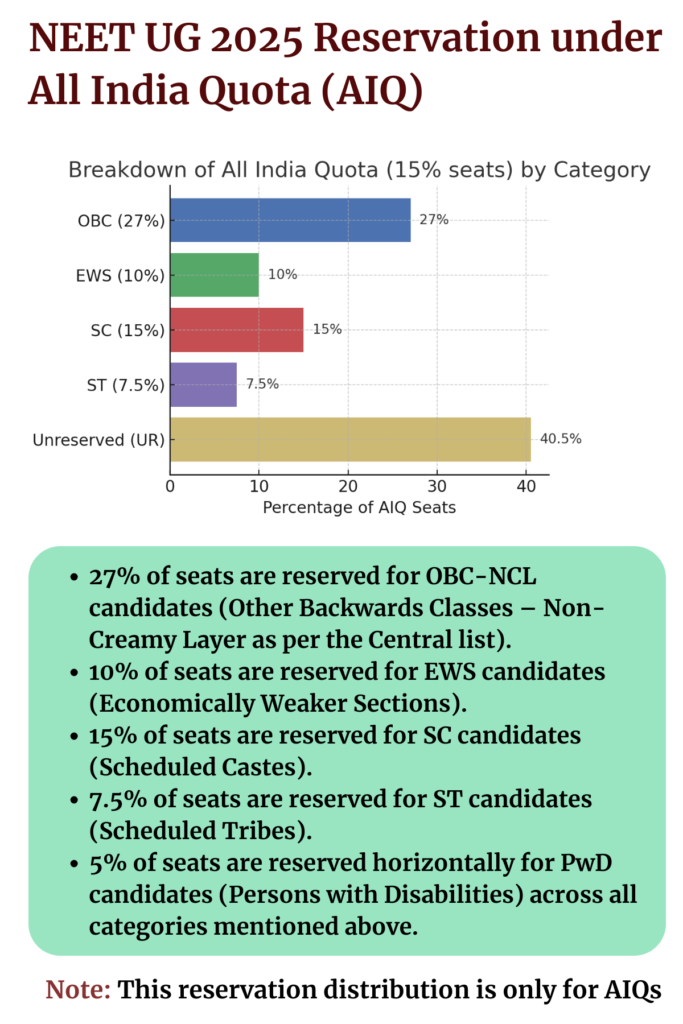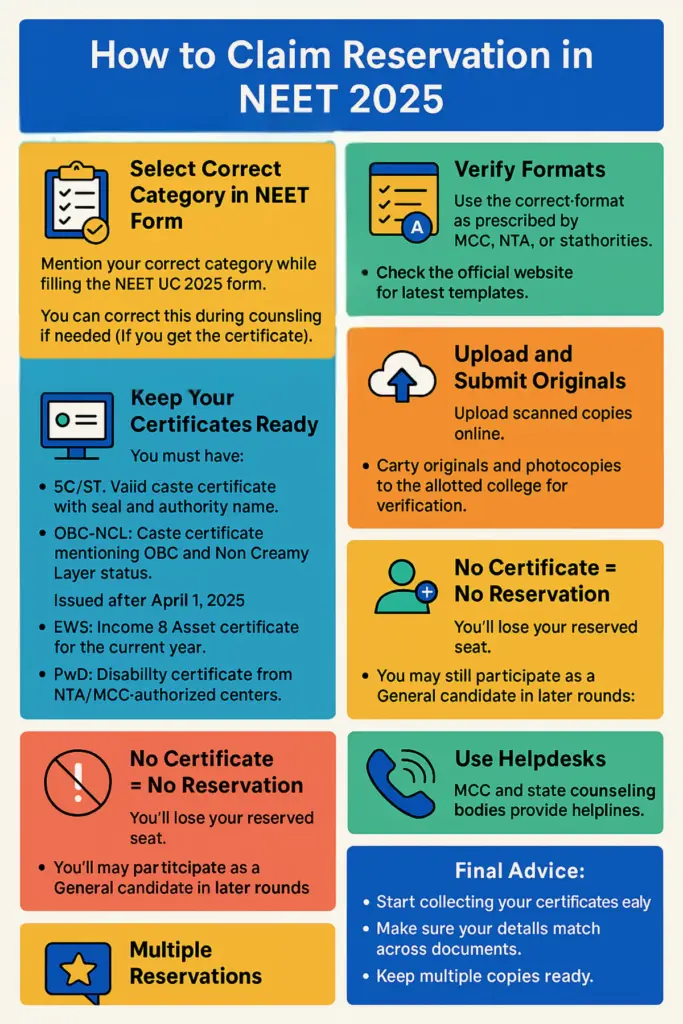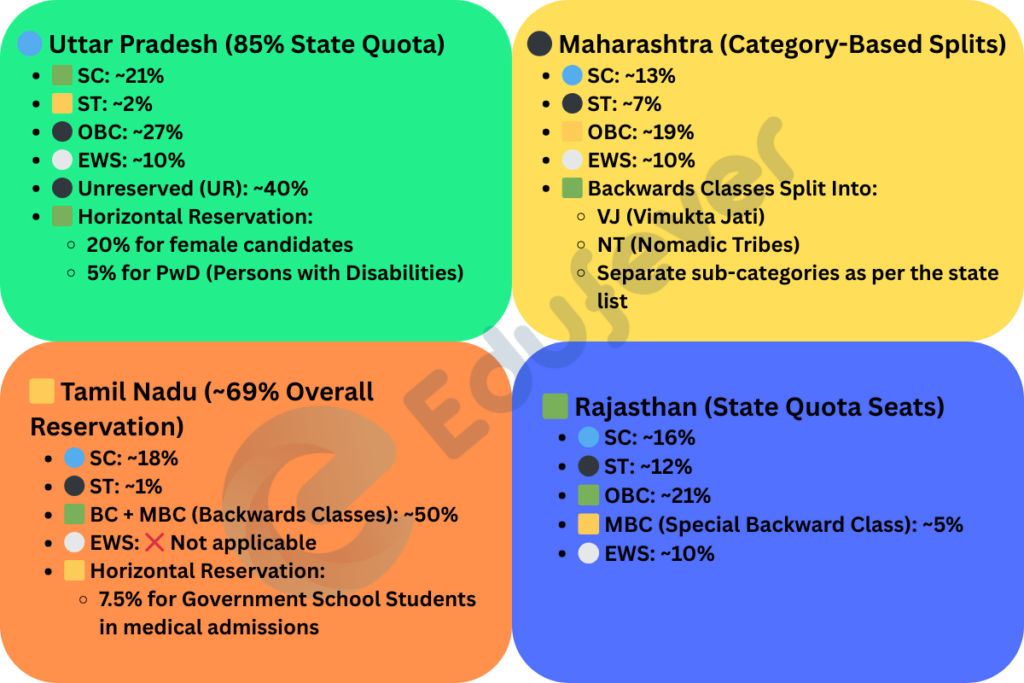NEET Reservation Criteria: The government of India is increasing medical seats in India every year to meet the increasing MBBS demand. As the competition continues to grow, candidates need to understand the reservation policy for the NEET 2026 exam. It is to give fair and equal opportunities to students from different backgrounds. The NEET reservation rules apply to both undergraduate (UG) and postgraduate (PG) medical admissions in government and selected private colleges.
NEET Reservation Criteria under All India Quota (AIQ)

In 2025, 15% of the seats in government medical colleges all over India are reserved under the All India Quota (AIQ). This reservation does not include colleges in Jammu and Kashmir unless candidates from there choose to apply under AIQ. The reservation breakdown is explained below:
Key Observations on NEET UG 2025 Reservation
- This means that in the AIQ, 59.5% of the seats are reserved (15% SC + 7.5% ST + 27% OBC + 10% EWS = 59.5%) for different categories.
- And, the remaining 40.5% are unreserved (General category).
- The 5% PwD reservation is horizontal, implying that 5% of seats in each category (including General) are earmarked for candidates with disabilities.
- Moreover, Jammu & Kashmir students do not participate in AIQ; its 15% seats remain with the state, and J&K students usually cannot avail AIQ seats elsewhere unless they opt out of domicile.
AIQ counselling under NEET UG
- It is conducted by DGHS/MCC at the national level.
- If you fall under any reserved category, you can compete for both reserved AIQ seats (for your category) and unreserved seats in AIQ.
- If a reserved seat is not filled (e.g., lack of ST candidates for some seat), it gets converted to another category as per the rules.
- General (UR) category seats are essentially the leftovers after all reservations.
NEET Reservation Criteria & Eligibility For SC, ST, OBC, PWD, & EWS
In this section, we explain each major reservation category (SC, ST, OBC-NCL, EWS, PwD) – who is eligible, what benefits they have, and what documentation is required.
Scheduled Caste (SC) Reservation
SC Reservation
- Candidates belonging to any of the Scheduled Castes listed in the official central/state lists are eligible for SC reservation.
- In AIQ (all colleges), 15% of seats are reserved for SCembibe.com.
- In state quotas, the percentage varies (often in the range of 15–20%, depending on the state’s SC population), for example, it’s 21% in UP and 16% in Rajasthan.
- SC candidates also have reserved seats in central institutions like AIIMS, JIPMER, etc., following the 15% rule.
Eligibility & Documentation
- You must belong to a Scheduled Caste community as per the Presidential order (the official list of SCs in your state/UT).
- Proof required:
- An SC certificate issued by a competent authority (usually Tehsildar, SDM, DM or equivalent rank) in the prescribed format.
- The certificate should clearly state that you belong to an SC community, and (for AIQ) it should be recognised in the central list.
- During counselling/admission, you’ll need to produce the original SC certificate.
Benefits
- SC candidates compete for seats in the 15% SC quota in AIQ counselling and the designated SC quota in state counselling.
- This means lower rank cut-offs for the SC category in many colleges.
- If an SC candidate scores high enough for an unreserved (General) seat, they can take an open seat as well.
- Unfilled SC seats (if any) may be converted to other categories as per the rules.
Tip: Ensure your caste certificate is up-to-date and verifiable and in the format required.
Scheduled Tribe (ST) Reservation
ST Reservation
- 7.5% of AIQ seats are reserved for Scheduled Tribes.
- State quota ST reservations again vary by state (e.g., 2% in UP, 12% in Rajasthan, etc., based on local ST population).
- ST candidates benefit from reserved seats in all government colleges, including central universities and national institutes.
Eligibility & Documentation
- Similar to SC, you must belong to a Scheduled Tribe as per official lists.
- A ST certificate issued by competent authorities is required as proof.
- It should mention the community and that you are recognised as an ST in that region.
- Present this certificate during counselling to claim the reservation.
Benefits
- ST candidates have a separate 7.5% quota in AIQ counselling and the designated ST quota in state counselling.
- They typically have lower qualifying cut-off marks and lower rank cut-offs for seat allotment.
- An ST candidate can also secure an unreserved seat if their rank is high enough
- Any unfilled ST seats can be redistributed as per the counselling rules.
Other Backwards Classes: Non-Creamy Layer (OBC-NCL)
OBC Reservation (Non-Creamy Layer)
- OBC candidates from the Non-Creamy Layer (NCL) are entitled to 27% reservation in AIQ seats since 2021.
- This applies to all central government medical/dental colleges and the AIQ portion of state colleges.
- In the state quota, OBC reservation depends on the state’s policy and definition of OBC – many states have OBC categories with varying percentages (often around 25-30%).
- Note that only the Non-Creamy Layer OBCs get reservation; those in the Creamy Layer (higher income group) are treated as the General category.
Non-Creamy Layer (OBC):
OBC candidates with a family income below ₹8 lakh/year (excluding agriculture income) are classified as Non-Creamy Layer and are eligible for reservation benefits.
Eligibility & Documentation
- You must belong to a caste listed in the Central List of OBCs (for AIQ reservation) and meet the Non-Creamy Layer criteria.
- Proof required
- An OBC-NCL certificate issued by a competent authority, typically stating that your caste is OBC and that you belong to NCL as per current rules.
- The certificate should be recent (issued on or after April 1, 2025, for NEET 2025 admissions).
- You will need this certificate during AIQ counselling; without it, even if you selected OBC in the form, you’ll be treated as the General category.
- For state quota, the state’s OBC list and certificate format will apply (some states recognise additional communities or have different income cut-offs).
Benefits
- OBC-NCL candidates have a substantial 27% portion of seats in AIQ counselling reserved.
- This increases their chances in central institutions and other state colleges under AIQ.
- In state quotas, OBC benefits vary: e.g., in UP it’s also 27%, in some states like Tamil Nadu, the equivalent (BC/MBC) reservations total around 50%.
- Lower cut-offs apply for OBC in NEET qualification (typically 40th percentile, same as SC/ST, if not filling General criteria) and in college allotments, the OBC closing ranks are usually lower (meaning more lenient) than General category for the same college. Remember, you will only get the benefit if you can produce a valid OBC-NCL certificate; failing that, you lose the reservation claim.
Economically Weaker Section (EWS) Reservation
EWS Reservation
- The Economically Weaker Section quota provides 10% reservation in seats for candidates who belong to the General (unreserved) category but have a family economic disadvantage.
- This is over and above the existing reservations and was implemented in NEET from 2019 onward as per the 103rd Constitutional Amendment.
- In AIQ, 10% of seats are reserved for EWS candidates (General category who meet EWS criteria).
- Many states have also adopted 10% EWS reservation in their 85% state quota (e.g., most North Indian states like UP, Rajasthan, etc.).
- But some states (like Tamil Nadu) have not implemented EWS in state colleges.
EWS Eligibility Criteria
To qualify as EWS, you must not belong to any other reservation category (SC/ST/OBC), and your family’s economic/assets status must fall below certain thresholds.
Key criteria (as defined by the Government of India) for EWS include:
- Family annual income: must be ≤ ₹8,00,000. (This includes income from all sources such as salary, agriculture, business, etc., for the financial year before the year of application.)
- The family must NOT own any of the following large assets, or else you are excluded from EWS:
- Agricultural land of size 5 acres or more.
- Residential flat of area 1000 sq ft or more.
- Residential plot of 100 sq yards or more in notified municipalities.
- Residential plot of 200 sq yards or more in non-notified areas.
If your family owns property beyond these limits or earns above ₹8 lakh, you are not eligible for EWS reservation.
Documentation
- To claim EWS, you need an “Income & Assets Certificate” (EWS certificate) issued by a local revenue officer (such as Tehsildar/SDM/DM) as per the prescribed format.
- This certificate must confirm that your family meets the EWS criteria.
- It typically has to be issued in the current year (for NEET 2025 admissions, a certificate issued after April 1, 2024).
- You must present this certificate during counselling to avail the 10% EWS quota; otherwise, you will be treated as the General category.
Benefits
- EWS candidates have 10% seats reserved in AIQ, which did not exist before 2019.
- This gives economically weaker General-category students a slightly lower competition pool for those seats.
- The NEET qualifying cutoff percentile for EWS is the same as General, but during seat allotment, EWS candidates have separate category ranks.
- EWS reservation is available in most central institutions and many state colleges.
- If an EWS seat remains unfilled, it usually reverts to the General pool.
Important: EWS reservation is only for General (UR) candidates. If you belong to SC/ST/OBC, you cannot switch to EWS. Also, be aware that some states might require a slightly different format or additional proof for EWS in state counselling.
Persons with Disabilities (PwD) Reservation
PwD Reservation
- Candidates with benchmark disabilities have a 5% reservation horizontally across all categories (both in AIQ and state quotas).
- “Horizontal” means this 5% cuts across every vertical category. For example, 5% of General seats are for PwD (General-PwD), 5% of SC seats for SC-PwD, and so on. This applies to all medical colleges as per the Rights of Persons with Disabilities Act 2016.
Eligibility
- To be eligible under the PwD quota, a candidate must have a benchmark disability, usually defined as 40% or more disability of a specified type.
- Disabilities can include locomotor disability, vision impairment, hearing impairment, neurological conditions, learning disabilities (like dyslexia), etc., as defined by NMC guidelines.
- Some categories of severe disability (like 100% vision loss) may not be eligible for medical courses for safety reasons, but most moderate disabilities are included with certain accommodations.
- Check the latest MCI/NMC guidelines for acceptable disabilities for MBBS/BDS.
Documentation
- A valid PwD certificate issued by an authorised medical board is required.
- NTA/MCC designates specific Disability Assessment Centres (around 12 centres across India) that are authorised to issue the final PwD certificate for NEET admissions.
- You should get evaluated at one of these centres (often located at major government medical institutions such as AIIMS, Safdarjung Hospital, Madras Medical College, etc., as listed by MCC).
- The certificate will mention the percentage and type of disability.
- This must be produced at the counselling to avail the PwD reservation.
Benefits
- PwD students get a relaxation in the NEET qualifying cutoff and have reserved seats in each category.
- PwD candidates compete for both the PwD reserved seats in their category and the normal seats in their category.
- They also receive certain accommodations in the exam (like extra time, scribes if needed, etc., which is a separate aspect).
- Utilising the 5% reservation can significantly improve chances for candidates with disabilities, provided they have the certificate and meet the minimum disability criteria.
Note: PwD reservations are available in all categories, including General. If a PwD seat in a category is not filled (no qualified PwD in that category), it reverts to the parent category seat.
Colleges Offering EWS Reservation:
- All India Institute of Medical Sciences (AIIMS)
- Jawaharlal Institute of Postgraduate Medical Education and Research (JIPMER)
- Banaras Hindu University (BHU)
- Aligarh Muslim University (AMU)
- VMMC & Safdarjung Hospital, New Delhi
- Lady Hardinge Medical College, New Delhi
- University College of Medical Sciences, New Delhi
- Institute of Medical Sciences, BHU, Varanasi
- State government medical colleges participating in AIQ
NEET Reservation Criteria 2025: Certificates Issuing Authority
Students applying for NEET UG 2025 under reserved categories must possess valid certificates issued by the designated authorities. The table below has details on the reservation categories and the competent authorities responsible for issuing the required certificates.
| Category | Nodal Authority |
|---|---|
| PwD (Locomotor Disability) | Duly Constituted Medical Board at Selected Central Government Hospitals |
| OBC-NCL | District Magistrate/Additional District Magistrate/Collector Deputy Commissioner/ Additional Deputy Commissioner / 1st Class Stipendary Magistrate/ Sub Divisional Magistrate/ Taluka Magistrate/Executive Magistrate/Extra Assistant Commissioner OR Chief Presidency Magistrate/Additional Chief Presidency Magistrate/ Presidency Magistrate, Revenue Officer (not below the rank of Tehsildar), Sub-divisional Officer |
| SC/ST | District Magistrate/Additional District Magistrate/Collector, Deputy Commissioner/ Additional Deputy Commissioner / 1st Class Stipendary Magistrate/ Sub Divisional Magistrate/ Taluka Magistrate/Executive Magistrate/Extra Assistant Commissioner OR Chief Presidency Magistrate/Additional Chief Presidency Magistrate/ Presidency Magistrate, Revenue Officer (not below the rank of Tehsildar), Sub-divisional Officer |
The certificate formats published in the NEET UG Information Bulletin indicate the nodal authorities for issuing these documents.
How to Claim a Reservation in NEET UG

85% State Quota Reservation – Rules and Domicile Requirement
Example: A student from Delhi cannot apply for state quota seats in Tamil Nadu unless they fulfil Tamil Nadu’s domicile requirements.
The remaining 85% of seats in government colleges are filled through state quota counselling. Each state (and UT) manages its counselling for these seats, and only candidates meeting that state’s domicile or residency criteria are eligible for its 85% seats.
85% of seats in government medical colleges are reserved for students who are residents (domicile holders) of the respective states. Each state decides its own reservation rules for categories like SC, ST, OBC, EWS, and others.
To claim a seat under the state quota:
- You must be a resident of that state.
- You must submit a valid domicile certificate during the admission process.
Domicile requirements vary by state (e.g., studying Class XI–XII in the state, or residency proofs, etc.), so check your state’s counselling prospectus.
State-Specific Reservation Policies
Unlike the AIQ percentages, each state has its own reservation policy for the 85% quota. All states do reserve seats for SC, ST, and usually OBC, but the percentages can differ, and additional categories or sub-categories often exist. For example:

These examples show the variation across states. Each state’s categories and quotas are “vertical reservations” (category-based), alongside their own horizontal reservations (like reservations for women, differently-abled, rural candidates, etc., within categories). Always refer to your state NEET counselling brochure for the exact breakdown applicable in 2025.
Note: If you qualify for NEET, you can participate in both AIQ and your state’s counselling in parallel (except J&K, which has special rules). 85% of state quota seats are strictly for candidates from that state. Make sure to fulfil domicile requirements (such as residence proofs, schooling certificates, etc.) when applying for state counselling.
Example: UP vs. AIQ Reservation Comparison
For a clearer picture, the table below compares the reservation in All India Quota vs Uttar Pradesh’s state quota:
| Category | AIQ Reservation (All States) | State Quota (Uttar Pradesh) |
| SC | 15% | 21% |
| ST | 7.5% | 2% |
| OBC (Non-Creamy Layer) | 27% | 27% |
| EWS (General-EWS) | 10% | 10% |
| PwD (Disability) | 5% (horizontal) | 5% (horizontal) |
| Domicile Requirement | None (open to all Indian nationals) | Must be UP domiciled (85% seats) |
Table: AIQ vs State Quota Reservations: The AIQ percentages are uniform nationally, whereas Uttar Pradesh (as an example) sets its own reservation percentages for the 85% state quota. Other states have their own patterns. Always check your state’s latest policy.
As shown, state quotas can have different percentages (e.g., SC 21% in UP vs 15% in AIQ) and sometimes additional reserved categories. Some states also opt out of certain central categories – notably, Tamil Nadu continues to exclude the EWS 10% in state seats. Such differences make it important to understand both the national and your state’s system for NEET 2025 counselling.
How to Apply for Reserved Seats in NEET UG 2025
To successfully claim a reserved seat under NEET 2025, you must:
- Choose your reservation category (SC/ST/OBC/EWS/PwD) while filling out the NEET application form.
- Upload the correct certificate issued by a valid authority at the time of application.
- Carry the original certificate during counselling for verification.
Important Note: If you fail to upload or produce valid documents, you will be considered as a General category candidate during admission.
The NEET reservation policy is designed to ensure equal educational opportunities for students from all backgrounds. Candidates must review the eligibility criteria carefully and ensure that they have all the required documents ready before NEET counselling. Keeping your reservation certificates valid and in the correct format is very important. Make sure to download the latest official notifications and forms from the NEET website to stay updated.



Sir/medam is there any reservations for assam rifles wards (defanece) for Central pool seats in mbbs/BDS college??
It depends upon the state admission counselling authorities.
I am belong to OBC category my father’s income certificate income show 30000/- if I got admission in pvt medical College then how much scholership I will get by PMS scholership scheme
I got 405 marks in neet exam I come under ST Category my All India rank is 185500 can I get AIQ and state quota of karnatak
Yes, there is the chance you must participate in the counselling.
How defence quota works in neet i mean it reduces rank etc.???
Yes, Defence quota applicable in Army Medical colleges.
What is last date for applying defense quota reservation for neet 2020?